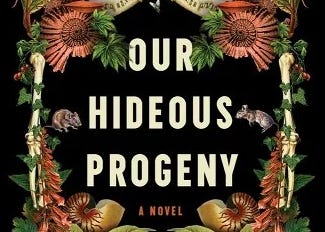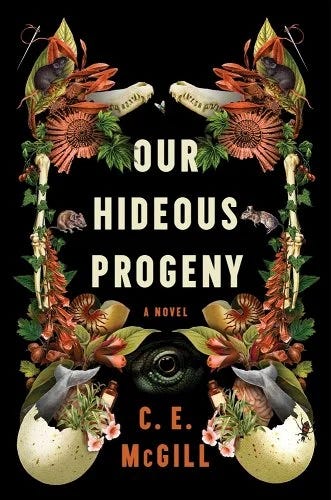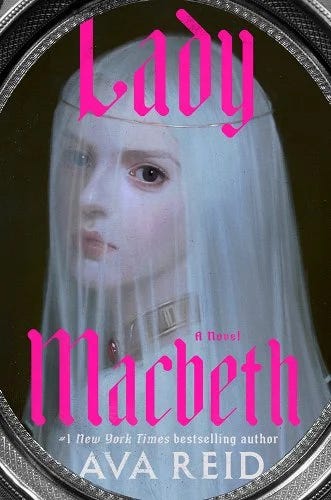Reimagining, sequel, adaptation — whatever you want to call it, Gothic fiction loves to retell a classic story. And early Gothic novels haunt recent ones like, well, ghosts.1 (That tracks 👻)
So perhaps it is unsurprising that the new twist on an old classic is so popular in Gothic fiction right now. (Every recommendation in this newsletter was published in 2023 or 2024, and there were more that I didn’t include.) Do we like this? Does it feel like the literary equivalent of the recycled IP in Hollywood? I can’t quite decide. If you have strong feelings about it, let me know in the comments.
This week: 3 retellings that I’ve read in the last year and my thoughts. Pick your favorite flavor of Gothic! (And see the end for a little cheat sheet of which book you might like best.)
The “continuation” of Frankenstein
Our Hideous Progeny (2023) by C.E. McGill. I think some people call this a continuation because the narrator is the great-niece of Victor Frankenstein? If that doesn’t appeal, don’t worry because it’s not really a big part of the story. (Raise your hand if Victor is your least favorite part of Frankenstein 🤚.)
Here’s the premise: Mary and Henry are a young (unhappily) married couple, both scientists keen to make their mark on the field. But when they find themselves broke, disgraced, and unwelcome among their fellow scientists, they devise a wild plan to restore their reputation. They will decamp to Henry’s native Scotland and build a dinosaur. A LIVING one. It’s Frankenstein 2.0!
I loved Our Hideous Progeny — it’s hands down my favorite of the books in today’s newsletter. One of my friends described it as “what The Essex Serpent wishes it could be” (lol). A few things I particularly love about it: (a) the queer love plot that emerges as the novel progresses,2 (b) the way McGill brings science to the foreground of the Frankenstein story,3 and (c) the fact that it’s Frankenstein with a female protagonist! Finally! (#deathtoVictor) But also, forget Frankenstein — this is an excellent book in its own right. It’s compelling, thoughtful, and made me feel all the things.
The authorized sequel to The Haunting of Hill House
A Haunting on the Hill (2023) by Elizabeth Hand. If you like Shirley Jackson’s The Haunting of Hill House, you will probably (?) enjoy A Haunting on the Hill. Elizabeth Hand’s new version isn’t as weird as Jackson’s (which is a bummer), but it’s a perfectly good spooky season read.
The premise? A bunch of friends head to the original Hill House™. Still there and still creepy as fuck. This time, instead of spiritualists investigating ghosts, you have New York theater people workshopping a play called Witching Night. In Jackson’s novel, Hill House brings out people’s worst qualities and causes them to turn on one another, and we see those same dynamics on full display in Hand’s modern sequel. The interpersonal tensions and misunderstandings can be just as stressful (and uncanny) as the things that go bump in the night. Will they survive the weekend? You’ll have to read to find out.
The feminist revision of Macbeth
Lady Macbeth (2024) by Ava Reid. The story of Macbeth told from, you guessed it, Lady Macbeth’s perspective.
This book seems like a thing that I would love. Lady Macbeth is the best character in Shakespeare. If RuPaul were a Shakespeare character, she would be Lady Macbeth. My cat is named Lady Macbeth! Who doesn’t adore this vicious queen?
And I don’t dislike this book. I would describe it as “a less fun, Macbeth-y version of Sofia Coppola’s Marie Antoinette, with fewer shoes.” (Does that sell you on it?) Similar to Coppola’s film, Reid’s novel shows us the girl before the queen: instead of the cold, power-hungry Lady Macbeth of the play, here we see a young, vulnerable teenage girl. But the best part? Reid builds on interpretations of Lady Macbeth that align her with the 3 witches: in Reid’s version, Lady Macbeth is a full-on witch. (Hell yeah)
If you’re a Macbeth stan like me, you will be curious about this book. Reid is an author I really enjoy (she is often described as a writer of “gothic fantasies”), but this might be my least favorite of her novels. If “gothic fantasy” appeals to you as much as it does to me, may I recommend Juniper & Thorn (2022) instead?4 Interestingly, Juniper & Thorn is also a retelling, in this case of the fairy tale “The Juniper Tree.” The retellings! They’re everywhere! There’s no escape.
In conclusion…
If you want a spooky season read
If you want a feminist read
If you want a queer love story
If you want a book that will make you say “wow, that was a quality book”
p.s. I own hard copies of all three of these books, so if you’re in Lexington, hit me up! If you’re not in Lexington, that is sad for you.
To wit: Rebecca (1938) is a version of Jane Eyre (1847), which is itself a version of the Bluebeard fairy tale; many haunted house stories are in conversation with Shirley Jackson’s classic The Haunting of Hill House (1959); and basically every 20th- and 21st-century vampire story owes something to Dracula (1897). (But if you want to read some non-Dracula vampire stories, check out my recs from last year!)
If you’re interested, The New Yorker has a good article on recent reimaginings of Frankenstein and queerness.
Content warning for abuse.








I recently finished “Our Hideous Progeny” and now I see that I somehow missed the more recent Night Hag on Surrealism. I appreciate the way Night Hag exposes me to new and interesting works and ideas that I would otherwise be unlikely to encounter.